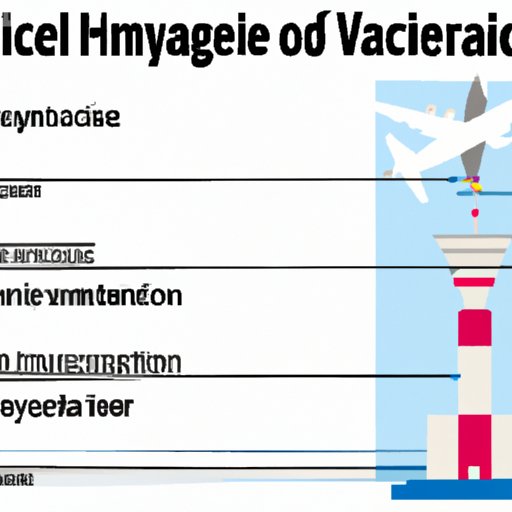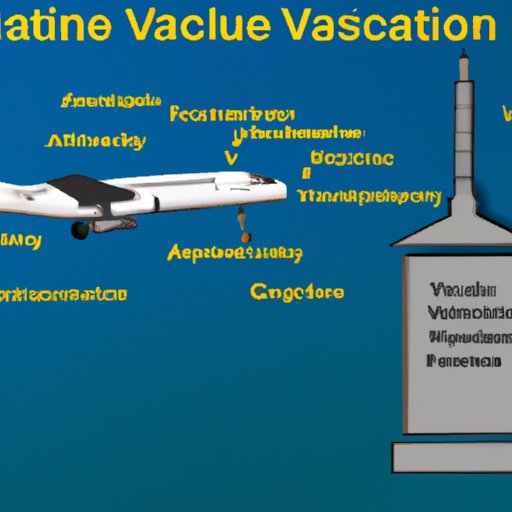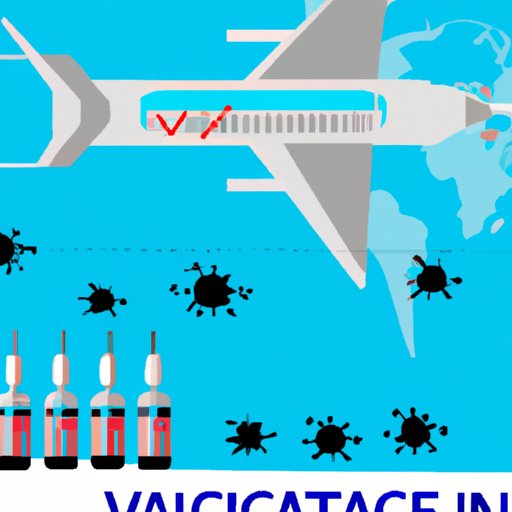Introduction
As the world continues to grapple with the COVID-19 pandemic, the question of whether or not people should be required to get vaccinated in order to fly has become increasingly prominent. In this article, we will explore the legal, scientific, and ethical implications of requiring vaccines for air travel, and take a closer look at how different countries are approaching this issue.
Exploring the Legality of Requiring Vaccines for Air Travel
When it comes to the legality of requiring vaccines for air travel, there is no clear-cut answer. Different countries have adopted different regulations regarding vaccine requirements for air travel, and many countries have yet to make any official policies on the matter. However, there are some international laws and treaties that may come into play when considering vaccine requirements for air travel.
Overview of Different Countries’ Regulations Regarding Vaccines for Air Travel
In the United States, the Centers for Disease Control and Prevention (CDC) has issued guidance recommending that all travelers get vaccinated against COVID-19 before traveling internationally. This recommendation is not legally binding, however, and does not apply to domestic travel within the United States. In Europe, the European Union Aviation Safety Agency (EASA) has issued similar recommendations for travelers, although these are also not legally binding. Other countries have taken a more stringent approach, with some requiring proof of vaccination for international travelers entering their borders.
Discussion of International Laws and Treaties Regarding Vaccine Requirements for Air Travel
The 1944 Convention on International Civil Aviation, commonly known as the Chicago Convention, sets international standards for aviation safety and security. The convention states that signatories must “exercise every precaution to avoid subjecting persons to measures of control which would be contrary to the principles of humanity.” This could be interpreted to mean that requiring vaccines for air travel could be considered a violation of the convention, depending on the interpretation of the phrase “principles of humanity.” Additionally, the World Health Organization (WHO) has issued guidance recommending that countries consider allowing vaccinated travelers to enter without restrictions, but it has not issued any binding regulations.

A Look at Vaccine Requirements for Airlines in Different Countries
While international laws and treaties may provide a framework for discussing vaccine requirements for air travel, it is ultimately up to individual countries to decide what rules they will implement. Here, we take a closer look at how different countries are approaching this issue.
Overview of Vaccine Requirements for U.S. Airlines
As mentioned above, the CDC has issued guidance recommending that all travelers get vaccinated before traveling internationally. However, this recommendation is not legally binding and does not apply to domestic travel within the United States. At the time of writing, no U.S. airlines have announced plans to require passengers to provide proof of vaccination prior to boarding flights.
Overview of Vaccine Requirements for European Airlines
In Europe, the EASA has recommended that travelers get vaccinated before traveling, but this recommendation is also not legally binding. As of now, most major European airlines have not announced plans to require passengers to provide proof of vaccination prior to boarding flights.
Overview of Vaccine Requirements for Asian Airlines
In Asia, a number of countries have implemented mandatory vaccination requirements for travelers, including China, Taiwan, and South Korea. In addition, some airlines in the region have announced plans to require passengers to provide proof of vaccination prior to boarding flights. For example, Singapore Airlines has announced that it will require passengers to provide proof of vaccination in order to board flights to certain countries.

Debating the Pros and Cons of Making Vaccines a Requirement for Flying
Requiring vaccines for air travel is a controversial topic, and there are both potential benefits and drawbacks to implementing such a policy. Here, we take a closer look at both sides of the debate.
Benefits of Vaccine Requirements for Air Travel
Proponents of vaccine requirements for air travel argue that such a policy could help reduce the risk of transmission of infectious diseases, especially on long-haul flights where passengers are in close contact for extended periods of time. Additionally, supporters of the policy argue that it could help restore confidence in air travel and encourage more people to travel, thus boosting the global economy.
Potential Drawbacks of Vaccine Requirements for Air Travel
Critics of vaccine requirements for air travel argue that such a policy could lead to discrimination against those who are unable to get vaccinated due to medical reasons or other factors. Additionally, some opponents of the policy argue that it could discourage travel by creating additional barriers to entry and making air travel more expensive.
How Vaccine Requirements for Air Travel Impact International Tourism
Regardless of one’s stance on the issue, it is clear that vaccine requirements for air travel could have a significant impact on international tourism. Here, we take a closer look at how such a policy might affect both domestic and international tourists.
Impact on Domestic Tourists
For domestic tourists, the main impact of vaccine requirements for air travel would likely be increased costs. Vaccines are not free, and many travelers may be unable to afford them. Additionally, those who do choose to get vaccinated may be faced with additional costs such as doctor’s visits and travel expenses associated with getting the vaccine.
Impact on International Tourists
For international tourists, the impact of vaccine requirements for air travel could be even more significant. Many countries require proof of a negative COVID-19 test prior to entry, and adding a vaccine requirement could create an additional barrier to entry. This could have a particularly significant impact on low-income travelers, who may struggle to afford the cost of the vaccine or the necessary tests.

Examining the Science Behind Vaccines and Air Travel Safety
In addition to the ethical and economic considerations of vaccine requirements for air travel, there is also the issue of safety. Here, we take a closer look at the science behind vaccines and air travel safety.
Overview of Scientific Studies on Vaccines and Air Travel Safety
There have been a number of scientific studies conducted on the efficacy of vaccines in preventing the spread of infectious diseases on airplanes. These studies have generally found that vaccines can reduce the risk of transmission of infectious diseases on airplanes, although the degree of protection varies depending on the type of vaccine and the specific virus being studied.
Summary of Findings from Scientific Studies
Overall, the findings from scientific studies suggest that vaccines can play a role in reducing the risk of transmission of infectious diseases on airplanes, although the exact degree of protection varies depending on the type of vaccine and the specific virus being studied. Additionally, it is important to note that vaccines alone cannot completely eliminate the risk of transmission, and other measures such as social distancing and mask wearing should also be implemented.
Conclusion
In conclusion, the debate surrounding vaccine requirements for air travel is complex and multifaceted. There are legal, ethical, economic, and scientific considerations to take into account when evaluating the merits of such a policy. Ultimately, it is up to individual countries to decide what policies they will implement, and only time will tell what the future of air travel looks like.
(Note: Is this article not meeting your expectations? Do you have knowledge or insights to share? Unlock new opportunities and expand your reach by joining our authors team. Click Registration to join us and share your expertise with our readers.)
